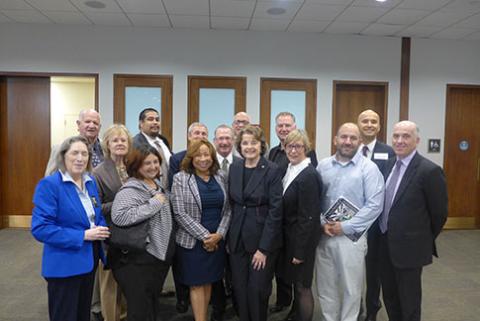Washington DC – Why we go
By FHCP’s President Alfred Fraijo, Jr. and Executive Director Laurie Goldman
FHCP goes to Washington DC to:
- Access information and services that we can use to develop, plan and design the Hollywood Central Park
- Understand the vast number of existing programs and policies that can benefit the Hollywood Central Park
- Share our progress with the administration, agencies and elected representatives
- Initiate a conversation to change “what is” into a “what should be”
- Recommend a course of action to benefit the stakeholders of our community
From our first trip to DC in 2007 to our most recent trip in May, FHCP’s engagement in substantive conversations at every level of government yields positive results which we transform into action.
FHCP goes to Washington DC because civic engagement is an essential component of our mission. As part of our strategy to create change we must engage the state and federal legislative processes.
Our meetings with the Department of Transportation are a case in point. Initially, DOT was not warm to the idea of a cap park over US 101 even though they worked with Seattle on the nation’s first cap park in 1976. It was difficult for an agency dedicated to transportation to understand the Park as a transportation project. It took many years of HCP progress, discussion, a change in leadership and shift in policy to gain DOT’s support. At our 2012 DOT meeting, former DOT Secretary Ray LaHood stated “Highways are scars on the landscape of America, decking our highways would be a positive step toward healing those scars.” This past May at a meeting with Deputy Secretary Victor Mendez, we discussed DOT’s commitment to livability and sustainability and their Grow America program. DOT is committed to place-making and the kind of smart growth that creates livable development.
DOT Secretary Foxx wrote the following in his Fast Lane blog on June 3, 2015, “I've said repeatedly that transportation should not create division; it should be the solution to past divisions. We've had a historic approach that emphasizes throughput --speeding people from one community through, over, or around another community-- usually by building a highway that actually isolates local residents from the jobs and other activities in a downtown business district. I've seen the consequences of throughput, the thwarted access to opportunity.”
Another illustration of why we go to DC can be found in our meetings with elected representatives.
Representative Adam Schiff, CA 28, is a perfect example. Since becoming HCP’s representative, Rep. Schiff has been a steadfast supporter. He has arranged meetings with FHWA, various agencies and his colleagues, all in an effort to advance our project forward with best practices. In a meeting with his colleague Representative Raul Grijalva, AZ 3, ranking member of the House Natural Resources Committee, we discussed NEPA’s social justice component, Title VI of the Civil Rights Act of 1964, and the President’s Executive Order 12898 on environmental justice and health.
With more than 150 cap parks in the United States, meeting with representatives who have cap parks in their districts provides a diversity of ideas, tools, and practical advice that adds to FHCP’s knowledge base and will only make the Hollywood Central Park a better project for the community it serves.
FHCP goes to Washington DC to make progress.
If you are interested in joining our annual trips to Washington DC and Sacramento, please contact Alfredo Hernandez at alfredo.hernandez@hfcp.org

l-r front row Sharyn Romano, Martha Hunt, Nicole Shahenian, Tanya Hart, Senator Dianne Feinstein, Laurie Goldman, Michael LoGrande and Jacob Lipa
l-r back row Edward Hunt, Alfredo Hernandez, David Green, Brian Folb, Phil Hart, Scott Campbell and Alfred Fraijo, Jr.

l-r front row Michael Lo Grande, Nicole Shahenian, Representative Adam Schiff, Laurie Goldman and Edward Hunt
l-r back row Jacob Lipa, Martha Hunt, Todd Warner, David Green, Brian Folb, and Sharyn Romano

l-r Alfredo Hernandez, Representative Raul Grijalva and Alfred Fraijo, Jr.









